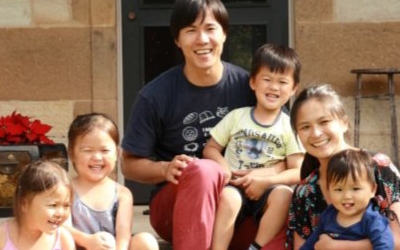
Learning to give our children to God
Lessons from two faithful mothers of the Bible.
I came to parenting late. I had my boys when I was 37 and 39 years old. So, by the time I got there, I had wanted to be a mum for almost 20 years. I had always wanted to have a life growing inside me, to have a little family of my own, to watch my child grow. When it happened, the love was deep—here was the realisation of a dream so long held. I was in awe of it all: the little fingers clasped around mine, the soft breath on my chest as they slept, the softness of their skin, the feathery hair tickling my shoulder. Even the sleepless nights and silent reflux, the scratchy nails and blood-curdling screaming couldn’t dampen my adoration.
Hannah’s astonishing attitude
Hannah, who we meet in 1 Samuel 1, also dreamed for years of becoming a mother. But her story stops me dead in my tracks. Hannah’s husband, Elkanah, had two wives: Peninnah, who had borne children by him, and Hannah, who had not (1 Samuel 1:1–2). Hannah longed for a child, so she prayed to God in deep anguish, weeping bitterly (1:10) and pouring out her soul (1:15). She made a vow:
Lord Almighty, if you will only look on your servant’s misery and remember me, and not forget your servant but give her a son, then I will give him to the Lord for all the days of his life. (1 Samuel 1:11)
God answered Hannah’s prayers: she fell pregnant and gave birth to a son, Samuel. When Samuel was weaned (probably around the age of three), she fulfilled her vow—she took him to the temple and gave him into God’s service (1:24). After that, Hannah only saw Samuel once a year when she went with Elkanah to offer their annual sacrifice (2:19).
Let’s just stop there for a moment to consider Hannah’s astonishing attitude to motherhood. Like me, Hannah longed for a child. But Hannah prayed for a son so that she could dedicate him back to God again! This stands as a profound rebuke to my own attitude: I just wanted a child for me.
So what would make Hannah dedicate her own son before he was even born? And what on earth would make her give him up at the age of three?
Hannah’s prayer of faith
Of course, the answer is nothing on earth. We can see this in Hannah’s profoundly beautiful and poetic prayer found in 1 Samuel 2:1–10. Even as Hannah gave up her son, her heart rejoiced in the Lord. She confessed that there is no-one besides God: he alone brings death and makes alive; he humbles the arrogant and exalts the humble (2:6–7). It is not by human strength that one prevails, prayed Hannah, but by faith in the God who saves.
Hannah also prayed that God would give strength to his king and exalt the horn (that is, the strength) of his anointed (2:10). But at this point in history, Israel had no king. So Hannah’s prayer was also prophetic—pointing forward to something that is yet to come. In fact, the very son she dedicated at the temple would be instrumental in bringing it about. He would become Samuel the prophet: the mouthpiece of God who anointed King Saul and then King David.
If Hannah had approached pregnancy like me, she would have stifled this process. Naturally, God will bring his plans to fruition whether people are obedient or not. But Hannah’s humble obedience in wanting a child for God, not for herself, meant that she came to play a pivotal part in God’s plans. Hannah exercised deep faith in God’s goodness and strength. So this narrative is not primarily about Hannah ‘giving up’ her son—it is about the faithful God she was giving him to.
Another mother’s prayer
In the New Testament we listen in to another mother’s prayer—Mary’s song in Luke 1—which bears some remarkable similarities to the prayer of Hannah. Like Hannah, Mary begins with ‘My soul glorifies the Lord’, even though she had just received the overwhelming news that she, an unmarried virgin, would become pregnant with God’s anointed King (1:26–38).
Mary’s song echoes the theme of Hannah’s prayer: ‘He has brought down rulers from their thrones but lifted up the humble’ (1:52). In this way her song triggers a literary muscle memory; it takes up a melody we’ve heard before. Hannah’s prayer laid the foundation for the bringing low of Saul, who looked every bit a king (1 Samuel 9:2) and the exaltation of David, who was a mere shepherd boy (1 Samuel 16:11). Now Mary’s prayer lays the foundation for the exaltation of her son, who was the antithesis of what people expected in God’s Messiah.
The words of these two mothers connect two points in the theological arc of salvation history—the beginning of the Kingdom of Israel and the beginning of the Kingdom of God. Both mothers humbly agree to play their part in God’s plans, regardless of the personal cost. Both Hannah and Mary would have to put aside their own desires and give their sons up into the service of God.
In some ways, my situation is quite different: my sons are not Jesus. I cannot imagine what it would have been like for Mary to watch her son grow knowing what she did. When Jesus was a baby, Simeon had prophesied that Jesus would grow up to face opposition, and that Mary’s soul would also be ‘pierced’ (Luke 2:34–35). Did Mary know exactly how it would end? Whatever Mary understood, she knew that Jesus was not just her son, but God’s.
Learning to give my children to God
I do not know what plans God has for my boys. Maybe they will have a random encounter with a stranger and point that person to Jesus. Maybe ministry lies in their future. Maybe they will be the doctor in Accident and Emergency who saves the life of someone significant. Or maybe they will simply live a life of quiet faithfulness. Who knows? Only God.
So that means I need to have Hannah and Mary’s humility and obedience. I need to raise my boys not for me, but for God: planted in God’s word with strong, deep roots; growing independently and leaning on God for themselves; faithfully fulfilling God’s plans for them, to the best of their ability. These boys are not mine as a possession: they are mine to grow and cherish and teach and nurture—but ultimately, they are God’s.
Mentally handing my sons over to God is difficult. It already breaks my heart to think of them growing up and not needing me like they do now. But God is great. And God is good. And God is true and faithful and mighty. And the best way I can rejoice in him as a mother, like Hannah and Mary before me, is to entrust my children to God, knowing that his plans for them will always be better than mine.
---
Ruth Baker is a single mum of two boys. She blogs at ‘Meet me where I am’ and is the author of ‘Are We There Yet?’ (ArkHouse Press, 2020).
For more articles from Growing Faith, subscribe to our monthly e-newsletter.
To hear about the latest books and resources from Youthworks Media, subscribe here.








